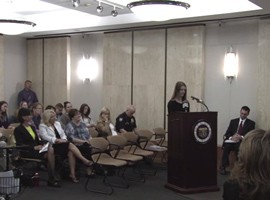Cronkite News has moved to a new home at cronkitenews.azpbs.org. Use this site to search archives from 2011 to May 2015. You can search the new site for current stories.
Study finds 165 victims of sex trafficking in Maricopa County probation system
PHOENIX – A survey that identified 165 sex-trafficking victims currently in the Maricopa County adult probation system illustrates the need for services such as drug and alcohol treatment to help them break free, a researcher said Wednesday.
“To understand that 165 victims exist within this system – to change the way that their life is going will require certain services,” said Dominique Roe-Sepowitz, director of Arizona State University’s Office of Sex Trafficking Intervention Research, which conducted the survey.
The two-week survey of county probation officers, funded by The McCain Institute for International Leadership at ASU, also identified 79 sex traffickers currently in the adult probation system. Roe-Sepowitz said that information can help victims as well.
“Perhaps this is another way we can change behaviors, by addressing trafficker behavior while they’re on adult probation,” she said.
Michael Cimino, deputy chief of the Maricopa County Adult Probation Department, who was part of the survey, said the most important thing those in his office can take from the study is the large role they have in eliminating sex trafficking.
“I’d like to see our officers continue to become more and more aware of the issues surrounding it as well as how they can assist in the investigation and enforcement side,” he said.
Of the 165 victims identified, the survey obtained specific information for 28 of them. Of those victims, 82 percent had some kind substance abuse problem and the majority had a history of sexual abuse. Also, 21 percent of those victims had a history of being in the probation system as a juvenile, a finding that Roe-Sepowitz called important.
“That means that we missed them,” she said. “That they were in our juvenile justice system and on probation and that they had not somehow been given services during that time related to trafficking.”
Roe-Sepowitz said she can say that with certainty because no such services currently exist.
Cindy McCain, co-chair of the Arizona Human Trafficking Council, said adding those services is a necessity because “a victim goes through so many different levels of injury,” she said.
Roe-Sepowitz said she and members of her office hope their continued research can help eliminate the problem in Arizona.
“From a research perspective, one of our long-term goals is to inquire and understand the prevalence of sex trafficking,” she said. “So right now we are just learning that there are little pools of people who have been trafficked within our system and we want to continue to do a comprehensive analysis.”
Cimino said the role that the probation office plays in sex trafficking is twofold.
“Both in how we resource and assist survivors, as well as, on the enforcement side, what we look for as officers,” he said.









